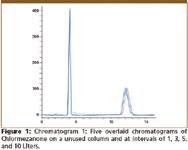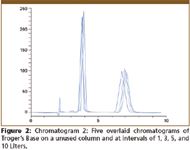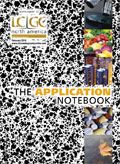Stability of the RegisPack® Chiral Stationary Phase Under Reversed-Phase LC Conditions
The RegisPack® chiral stationary phase allows for the enantiomeric separations of a wide variety of racemate classes.
Ted Szczerba, Regis Technologies, Inc.
An investigative study was carried out to assess the feasibility and stability of employing a RegisPack® column under reversed-phase conditions.
A random selection of five compounds was chosen for this study. The compounds include Troger's Base, Flavanone, Chlormezanone, Omeprazole, and Trans-stilbene oxide (TSO).
A 10 μ, 25 cm × 4.6 mm RegisPack® column was used for the study.

Table I
The compounds were tested on a fresh column and then at intervals after treatment of 1,000 mL, 3,000 mL, 5,000 mL, and 10,000 mL of a mobile phase consisting of H2O/CH3OH (60/40).

Figure 1
All compounds were tested at a flow rate of 1.5 mL/min consisting of a mobile phase made up of CH3OH/H2O (95/5) (except Omeprazole). Omeprazole utilized a mobile phase consisting of 100% methanol. Capacity factors and separation factors were measured after each interval. Following are the summarized results of this study.

Figure 2
Conclusion
The data shows that the RegisPack® CSP can tolerate the use of up to 60% water in the mobile phase for prolonged periods with no significant deterioration of the CSP.
Note: Running the RegisPack® column under reversed-phase conditions does alter the characteristics of the column. Methods that were previously run under normal-phase conditions may be altered. If the column is used under mobile phase conditions containing water, it should be dedicated to RP conditions and not be used under NP conditions.

Regis Technologies, Inc.
8210 Austin Ave, Morton Grove, IL 60053
tel. (847)583-7661; fax (847)967-1214
Website: www.registech.com

SEC-MALS of Antibody Therapeutics—A Robust Method for In-Depth Sample Characterization
June 1st 2022Monoclonal antibodies (mAbs) are effective therapeutics for cancers, auto-immune diseases, viral infections, and other diseases. Recent developments in antibody therapeutics aim to add more specific binding regions (bi- and multi-specificity) to increase their effectiveness and/or to downsize the molecule to the specific binding regions (for example, scFv or Fab fragment) to achieve better penetration of the tissue. As the molecule gets more complex, the possible high and low molecular weight (H/LMW) impurities become more complex, too. In order to accurately analyze the various species, more advanced detection than ultraviolet (UV) is required to characterize a mAb sample.















